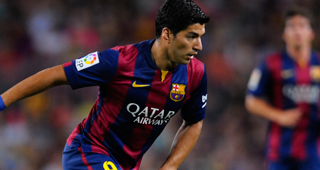Since time is a flat circle at RealGM, year-end best-of lists are typically a meaningless exercise. But with the launch of our soccer page and the most entertaining World Cup of most of our lifetimes going down in 2014, it put us in a sentimental and reflective mood.
In no particular order, here are the 10 moments most worthy of putting in a time capsule to define 2014:
- Atlético ties Barcelona at the Camp Nou on final day of La Liga season to win title
The stakes on the final day of the season were simple: Atleti wins La Liga with a win or a tie, while Barcelona wins La Liga with a win.
Diego Costa came off in the 14th minute with a predictable recurrence of his hamstring injury and then Arda Turan was injured in the 21st minute. Barcelona went up with a great goal by Alexis Sánchez in the 32nd minute that was first created by a ball into the box to Lionel Messi from Cesc Fabregas.
Atleti came out after halftime and scored in the 49th minute on a Diego Godin header off a corner.
Messi had a few chances to go ahead, including a disallowed goal on an offside call, but Atleti withstood it all to walk off Camp Nou with the all-important tie and the crown. Atleti received a great ovation from the Barça fans for what they improbably accomplished.
Diego Simeone slayed the two-headed monster of Barcelona and Real Madrid, to become the first non-FCB/RM club to win La Liga since Valencia in 2004.
- Bundesliga becomes the world’s best league
All four German clubs advanced out of the group stage of the Champions League for the second straight season, including Jürgen Klopp’s Borussia Dortmund, who sit in the relegation zone of the Bundesliga.
Klopp is owed a big debt to the fastpaced, high-pressing style that has become norm in the Bundesliga where matches are won and lost in the midfield. The Bundesglia has more shots per game than the other major leagues and the quality of play is tangibly better.
Bayern Munich has been ludicrously dominant over the past two and a half seasons where the title chase has had no sense of drama, but the pure entertainment quotient of the play is there and any of the top half of the German clubs would do exceptionally well in Spain and England.
- Steven Gerrard tragically slips to end Liverpool’s title chances
Liverpool hasn’t won the Premier League since 1990 and Gerrard has been the heart and soul of the club since he became captain in 2003. Gerrard had a 13-14 in which he returned to form playing behind all-everything Luis Suárez and Liverpool unexpectedly was in title contention with Manchester City late into the season. José Mourinho and Chelsea brought his B team to Anfield between the two legs of the Champions League tie and played the role of spoilers with a 2-0 win.
Chelsea’s first goal came when Gerrard’s slip created a clear path for Demba Ba. It was a devastating goal to allow that completely took Liverpool, a side built to play with a lead, away from what they did best for that magical yet no result season under Brendan Rodgers.
- Deadline Day
Yu Miyagawa wrote about how the reasons for following sports increasingly involve what goes on off the field/court/etc. and it fully hit soccer during the final day of the summer transfer window in August.
“The 2014 summer transfer deadline day featured characters, stakes, money, and profanity - all the makings of a good Netflix series,” wrote Miyagawa.
A book and then a film is what people remember most about the Billy Beane era, more than any one play and that could conceivably happen more in the future with soccer despite the distinctive and memorable nature of how important goals are scored.
The final day involved Radamel Falcao, Danny Welbeck and a bunch of Edinson Cavani rumors, but most of the critical moves (Costa, Cesc, Kroos, Sánchez, Suárez) were wisely completed early. Even the Xabi Alonso to Bayern emergency transfer was finalized a few days before the deadline.
- Pep Guardiola vs. Caleb Porter
Bayern Munich swung by Portland in August to play the MLS All-Stars, led by Timbers’ manager Caleb Porter.
The match was one of several send-offs for Landon Donovan and Thierry Henry, but the finger-waiving displeasure of Guardiola toward Porter with all of the feisty challenges from the MLS side in an exhibition match become the amusing story, particularly when Porter unsuccessfully tried to shake his hand.
- Expected goals becomes go-to metric in soccer analytics
It was a breakthrough year for expected goals, which is a fairly simple estimate on the total number of goals a team can expect to score or give up by assigning a value based on shot location, how the shot was created and other important factors.
The xG data and shot charts compiled by Michael Caley in the World Cup became indispensible and was an invaluable predictor once we reached the group stage.
James Rodríguez and Colombia captured the imagination of a lot of fans in the group stage, but their +0.15 xG before the Brazil match suggested they were finishing at an unsustainable rate.
Germany and France were clear favorites in this category and their match in the quarterfinals very well decided the World Cup.
Before even reading the match reports, finding Caley’s xG map on Twitter has become an essential peek behind the curtain of a final score that can often be misleading.
- Luis Suárez's “Marriage of Heaven and Hell” World Cup
Luis Suárez has no off days. No player as good as Suárez also has his kind of work rate on the pitch and he remains one of the most absorbing figures in the world in his non-playing capacities.
Suárez hit peak relevance this year before, during and after the World Cup. Here’s a concise rundown:
a. Leads Liverpool to cusp of EPL title with a historically dominant season
b. Injures meniscus
c. Media coverage of injury
d. Wants to leave Liverpool
e. Scores a brace against England
f. Bites Giorgio Chiellini in next match
g. Sold to Barcelona
Suárez has looked more like a glorified version of Pedro than the transcendent top-5 in the world talent he was last season in England. At some point in 2015, the current honeymoon phase will be over for Suárez or perhaps he will be the focal point for Barcelona if Messi leaves.
- Real Madrid beats Atleti in Champions League Final
Winning the Champions League Final in a World Cup year is sometimes an overshadowed event, but we were privileged with a Madrid derby in Lisbon and Atleti nearly pulled off the upset until Sergio Ramos scored in the third minute of stoppage time.
The onslaught of three more goals in extra time was a coronation of Real Madrid for 2014 and a preview of what we’ve seen so far in 14-15. Gareth Bale scored the go-ahead goal in the 110th minute, followed by Marcelo in the 118th minute and Cristiano Ronaldo converted a penalty kick in the 120th minute. An understated part of that match that also proved to be an indicator of where Carlo Ancelotti would take Real Madrid was the play of Isco in the second half.
Atleti did so well to limit Ronaldo throughout the match, but it was of course overshadowed with his meaningless penalty kick and his post-conversion jersey removal flexing. Real Madrid probably beats Atleti seven times out of ten and a club with their resources perhaps never again reaches the Champions League Final and that heartbreak had to be in the back of your head while watching the Real Madrid firepower mesmerized.
- United States allows match-tying goal to Portugal in stoppage time
The John Brooks’ late goal against Ghana and Tim Howard’s superhuman performance in goal against Belgium were thrilling moments, but giving up a last-second goal to Portugal in the second match of the group stage was probably the better indicator of where the United States really was, for better and worse, during the World Cup.
With a 2-1 lead and stoppage time winding down, Michael Bradley gave away possession to create a Portugal counter in which Ronaldo was given space to send in a perfectly placed cross to Silvestre Varela for a header that beat Howard.
The United States were the better side in that match and would have advanced out of the infamous Group of Death into the knockout phase after collecting six points from their first two matches. They eventually slid into the Round of 16 with a 1-1-1 record.
- Mario Götze’s winner for Germany in World Cup Final
The aesthetics or degree of difficulty aren’t really needed to add to the magnitude of a World Cup winning goal in the 112th minute, but Mario Götze’s ability to control Andre Schürrle’s cross with his chest before finishing a left-footed volley was extraordinary.
In some ways Götze personifies where German football has gone since the Berlin Wall came down a few years before he was born. Götze was born in Bavaria, but was raised in Dortmund’s youth academy and came up with the club as a teenager before he was bought by Bayern Munich. Germany won the World Cup with a blend older players like Philipp Lahm and Bastian Schweinsteiger and the next generation of Mats Hummels, Götze, Thomas Müller, Toni Kroos and Mesut Özil.
Messi and Argentina had several chances early to become an improbable champion and for him to truly join the pantheon of all-time greats, but Germany had too much depth of talent and the goal created by two substitutes made them a deserving champion.



